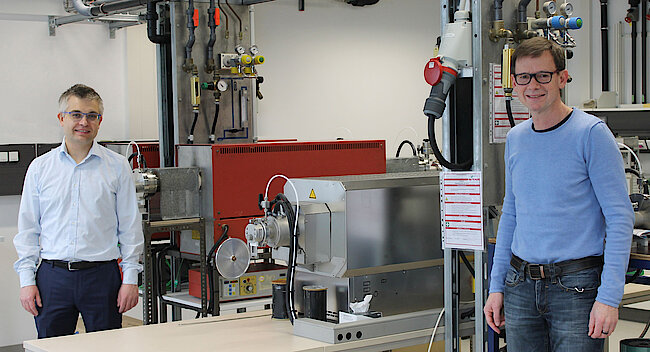
(Picture: Prof. Dr.-Ing. Stefan Schafföner (left) and PD Dr. Günter Motz (right) in front of a furnace for the processing of the carbon fibres at 1400 degrees Celsius. Photo: Christian Wißler.)
Composite materials containing carbon fibre are used today in aviation, automotive, aerospace, construction, wind turbines, but also in medical and sports products. Carbon fibre is produced industrially from carbon-containing raw materials. They are very light and have excellent mechanical properties, for example they have more than 35 times the strength of human hair. Hence fibre-reinforced plastics and fibre-reinforced ceramics are superior to many other materials, and actually, it is impossible to imagine innovative industries without them. However, the carbon fibres that have been used to date have one disadvantage that significantly limits their possible application. At temperatures above 400 degrees Celsius, they begin to oxidise and consequently become unstable. As a result, they are not suitable for technological applications in which composite materials have to be heat-resistant for longer periods of time, or they have to be protected at great expense.
The new research project at the University of Bayreuth therefore aims to develop a new generation of carbon-based fibres that can be further processed into composite materials without much technical effort, but remain stable even at very high temperatures, and have increased strength. The project combines research experience from macromolecular chemistry and ceramic materials technology. It uses state-of-the-art research technology that has been established in these fields at the University of Bayreuth in recent years. Of particular importance are the production of polymers characterised by the desired structures and properties, as well as electrospinning, which enables the production of the finely structured polymer fibres. This will be followed by the processes of curing and pyrolysis, so that the spun fibres finally represent a tailor-made reinforcement of plastics or ceramics.
"Currently, we are seeing that the global market for carbon-based fibres is growing very fast. These fibres have recently gained real strategic importance for innovative high-tech developments. Thanks to the generous funding from the DFG, we in Bayreuth will be able to make important contributions to this dynamic development," says PD Dr. Günter Motz from the Ceramic Materials Engineering research group. Prof. Dr. Andreas Greiner, Chair of Macromolecular Chemistry II, adds: "We will involve young scientists in the demanding research work of the new project right from the outset, for example within the framework of our elite study programme 'Macromolecular Science' in the Elite Network Bavaria, and even in the master's degree programmes 'Polymer Science' and 'Materials Science & Engineering'".
Contact Information:
PD Dr. Günter Motz / Prof. Dr.-Ing. Stefan Schafföner
Ceramic Materials Engineering
University of Bayreuth
Phone: +49 (0)921 / 55-6509 and 55-6500
E-mail: guenter.motzuni-bayreuth.de / stefan.schaffoeneruni-bayreuth.de
Prof. Dr. Andreas Greiner
Macromolecular Chemistry II
University of Bayreuth
Phone: +49 (0)921 / 55-3399
E-mail: andreas.greineruni-bayreuth.de
(Source: University of Bayreuth)
![[Translate to English:]](/fileadmin/_processed_/f/0/csm_logodgm-4_b2722eeace.png)
![[Translate to English:]](/fileadmin/user_upload/logodgm-4.png)